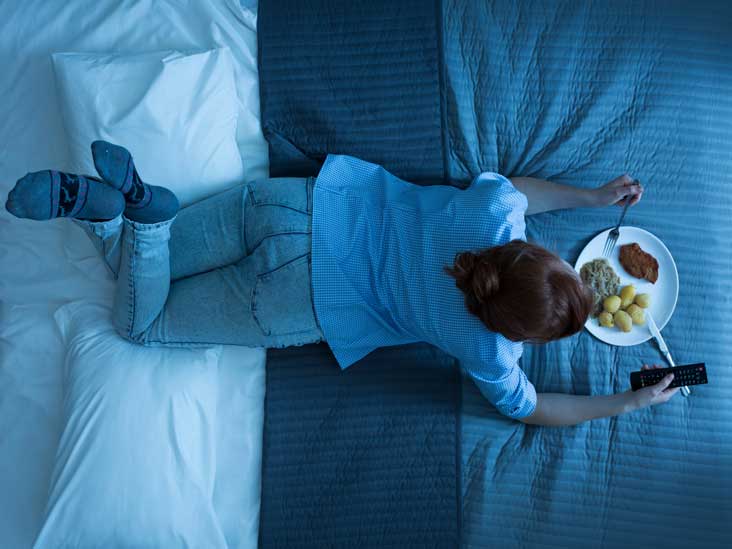It is no secret that sleep deprivation can hurt your physical and mental health. And while it might not seem like something that would lead to weight gain, research has shown that people who sleep eat more than those who don’t get enough sleep. In this article, we will be looking at the disorder known as sleep eating, and what you can do to prevent it from happening to you. We will also provide some tips on how to deal with the effects of sleep deprivation if you find yourself struggling to resist the temptation to eat while you’re sleeping.
Contents
What is Sleep Eating?

Sleep eating is an eating disorder that occurs when a person eats food while asleep, without realizing it. Sleep eating can occur during any stage of sleep, but is most common in children and young adults. The person may eat large amounts of food or consume sweets or other high-calorie items. Sleep eating can be a serious problem if not treated, and can lead to weight gain and obesity. There is no known cure for sleep eating, but treatment focuses on managing the symptoms. If you are concerned about your child or loved one with sleep eating, speak to your doctor.
The Different Types of Sleep Eating
There are many different types of sleep eating, each with its unique pathology. Here are four of the most common:
1. Sleep eating disorder (SED) is the most common type of sleep eating and is characterized by recurrent episodes of eating something while asleep. This type of eating disorder can be very damaging to your health, leading to weight gain and obesity. People withSED often have trouble falling asleep and often eat large amounts of food to stay awake.
2. Night-eating syndrome (NES) is a condition that’s characterized by eating large amounts of food during the night. This type of eating disorder can be problematic because it can lead to weight gain and obesity, as well as increased levels of ghrelin, a hormone that signals the body to seek out food.
3. Sleep-associated eating disorder (SAED) is a relatively new diagnosis that’s been coined for people who engage in this type of eating disorder but don’t have SED. SAED is still a developing field and isn’t well understood, so there’s not much information available about it yet. However, it appears to be similar to SED in terms of its pathology and consequences.
4. Parasomnia is a term that refers to any type of abnormal sleeping behavior. This includes sleep eating, which is considered an example of parasomnia Nocturna. Parasomnia Nocturna is when people have problems sleeping at night and start to eat large amounts of food to stay awake.
5. Purging: Another type of sleep eating that’s often referred to as purging is when people eat large amounts of food during a period of intense stress or emotional distress. This type of eating disorder can be problematic because it can lead to weight gain and obesity, as well as increased levels of ghrelin, a hormone that signals the body to seek out food.
Symptoms of Sleep Eating

Sleep eating is a behavior in which people eat in bed while sleeping. It can be a problem for people of all ages, but it is especially common in young adults and adolescents. Sleep eating can occur at any time during the night, but it is most common in the hours before dawn.
Sleep eating can cause weight gain because the person is eating more than they would if they were awake. It can also lead to problems with blood sugar control and mood swings. People who sleep eat often feel like they are not able to control their eating when they are asleep, and they may feel ashamed or embarrassed about their behavior.
There are many different symptoms of sleep eating, but the most common are:
Eating large amounts of food without realizing it: This is one of the most common symptoms of this type of eating disorder. People often eat an entire meal or more while they are sleeping. Sometimes they eat food that is not very nutritious or that they would not normally eat.
Feeling like you cannot stop eating: This is another common symptom of sleep eating. People often feel like they cannot stop eating once they start eating. They may feel like they are going to vomit or choke if they do not keep eating.
Consuming large amounts of food during the day: People who sleep eat often consume large amounts of food during the day, even when they are not hungry. This can lead to weight gain and problems with blood sugar control and mood swings.
Having trouble stopping or moderating how much food is eaten: Another sign of this type of eating disorder is that people often eat too much even when they are not hungry. They may eat more than they should or than is healthy for their body.
Having trouble recalling what happened during the period when you ate: This is another common symptom of sleep eating. People often can’t remember what happened while they were eating. This can make it difficult to stop eating or to understand why they are gaining weight.
Feeling like one’s body is not responding to signals telling one to stop eating: is a rare symptom of sleep eating, but it can happen. People who sleep and eat may not feel the full effects of the hunger signals that their body is sending. This can lead to them eating more than they would normally. They may also experience problems with their diet if they sleep and eat regularly.
Causes of Sleep Eating
Sleep eating is a disorder that happens when people eat significantly more than they need during sleep. It’s not clear what causes it, but several things can contribute.
This type of eating disorder can be caused by several things, including:
1. Stress: A lot of people eating problems stem from stress, whether it’s from work, personal life, or just general everyday stress. When stress is constantly weighing on someone, it can lead to extreme food cravings in times of relaxation (like when you’re sleeping).
2. Anxiety: Just like with stress, anxiety can cause people to have intense cravings for certain foods. This is because anxiety makes us feel out of control, and one way to deal with that feeling is to take out our anger and frustration on something physical. In other words, anxiety can make people seek comfort through food.
3. Depression: Although this is less common than the other two conditions, depression can also cause people to have cravings for food and consume more than they’d normally eat. This is because depression decreases appetite and causes a person to feel physically unwell. This leaves them feeling tired and fragile, which makes them crave foods that give them a sense of stability and well-being.
4. Obsessive-Compulsive Disorder (OCD): People with OCD often have very strict dietary rules, which can lead to them eating out of boredom or because they feel like they have to. This is because, for people with OCD, food is often associated with a sense of peace and security. When these foods are no longer available to the person with OCD, the obsession and compulsion to eat them can lead to cravings.
5. Anorexia Nervosa: Eating too little can lead to anorexia nervosa, which is a very serious mental disorder that causes people to lose weight at an extremely fast rate and become extremely restrictive in their diet. This can cause them to have intense food cravings, especially for high-calorie foods.
What Can Happen When You Are Sleep Eating?

If you’ve ever found yourself snacking on something during the night, you might be wondering what can happen if you sleep and eat. Sleep eating is when an individual consumes food or drinks while they are asleep. While it may seem like a harmless habit, several consequences can come from sleep eating. Here’s a look at what can happen when you sleep and eat and how to prevent it from happening in the first place.
1. You Can Gain Weight
One of the most common consequences of this type of eating disorder is weight gain. When an individual consumes food or drinks while they are asleep, they may not be aware of what they’re eating. This can lead to them consuming more calories than they would if they had eaten in the daytime. Over time, this can lead to weight gain and obesity.
2. You Can Become Addicted To Sleep Eating
If you become addicted to sleep eating, you may find yourself unable to stop eating even when you’re not hungry. This can have several negative consequences, including increased weight and health problems such as diabetes.
3. You Could Damage Your Health
Sleep eating can also have negative impacts on your health overall. For example, it can increase your risk of developing obesity and other health problems. Additionally, sleep eating can lead to stomach ulcers and other digestive problems.
4. You Could Lose Sleep
One of the main consequences of this type of eating disorder is that it can cause you to lose sleep. When you consume food or drinks while you’re asleep, you’re likely to wake up feeling tired and groggy. This can lead to several other issues, such as decreased productivity and an increased risk of accidents.
5. You Could Feel Guilty
If you’re prone to sleep eating, you may experience feelings of guilt and shame. This is because you may feel like you’re cheating on your diet by eating while you’re asleep. Additionally, sleep eating can lead to weight gain and health problems, which may make you feel even worse about yourself. If you’re struggling with sleep eating, it’s important to talk to a healthcare provider. They can help you understand the consequences of sleep eating and provide tips on how to stop it from happening.
Treatment for Sleep Eating

There is no one-size-fits-all answer to treating sleep eating, as the individual’s needs will vary depending on the severity of their disorder and the methods used. These are some of the treatment methods for sleep eating that is successful:
1. Cognitive-behavioral therapy (CBT): CBT is a type of therapy that helps people change the way they think and behave. It can help people learn how to manage their emotions and control their eating habits.
2. Professional counseling: Counseling can also be a helpful tool for treating this type of eating disorder. Counselors can help individuals understand the causes and effects of their sleep-eating behaviors, as well as provide support and guidance for changing them.
3. Medication: Some people may require medication to treat their sleep-eating disorder. Medications can help individuals to regulate their appetite and reduce cravings for food during episodes of this type of eating disorder.
4. Group therapy: Group therapy can also be an effective treatment for sleep eating disorders. Groups provide participants with support, which can help them learn new strategies for managing their food intake and improving their overall quality of life.
5. Diet counseling: Diet counseling can be an effective tool for helping people to improve their eating habits. Diet counselors can provide guidance and support for changing the way someone eats, as well as provide advice on healthy foods to eat.
Tips for Avoiding Sleep Eating
If you’re struggling with sleep eating, here are some tips to help you avoid it.
1. Make a plan. Before bed, write out your goals for the night and focus on completing as many of them as possible. This will help you stay motivated throughout the night.
2. Establish healthy sleep habits. Avoid watching television or using electronics in bed, and try to go to bed and wake up at the same time each day. This will help you get enough quality sleep.
3. Avoid eating before bed. This will help you avoid eating any snacks or food in bed, which can lead to sleep eating.
5. Don’t stress over the issue. If you find yourself struggling with sleep eating, don’t beat yourself up about it. Just try to relax and ride out the occasional lapse in judgment.
4. Get support from family and friends. It can be difficult to seek help for a problem like this type of eating disorder, but it is important to have a support system available if needed. Let your loved ones know that you are struggling and ask for their assistance in helping you to overcome this issue.
5. Recognize the warning signs. If you think you are struggling with sleep eating, start by keeping a food diary to track what foods are being consumed during wakefulness and sleep. This will help you identify any patterns that may be indicative of an underlying problem.
6. Talk to a therapist or counselor. A therapist or counselor can help you explore your thoughts and feelings about sleep eating and provide guidance on how to manage this behavior. They can also help you develop healthy coping mechanisms for addressing problems with food consumption during awake hours.
If you find that this type of eating disorder is a recurring issue, it may be helpful to seek help from a therapist or counselor. These professionals can provide you with advice and support in overcoming the problem.
Conclusion
If you’re someone who regularly eats while sleeping, there’s a good chance that you’ve heard of sleep eating. But what is it and why does it happen? In this article, we’ll take a look at the basics of sleep eating and explore its prevalence in the population. We’ll also discuss the possible causes and effects of this disorder so that you can start to understand how to deal with it if it’s affecting your life negatively.
Hope this article was of help to you! If you are suffering from mental health disorders, you may seek help from Therapy Mantra. We have a team of highly trained and experienced therapists who can provide you with the tools and skills necessary for overcoming mental health disorders. Contact us today to schedule an online therapy or download our free Android or iOS app for more information.


